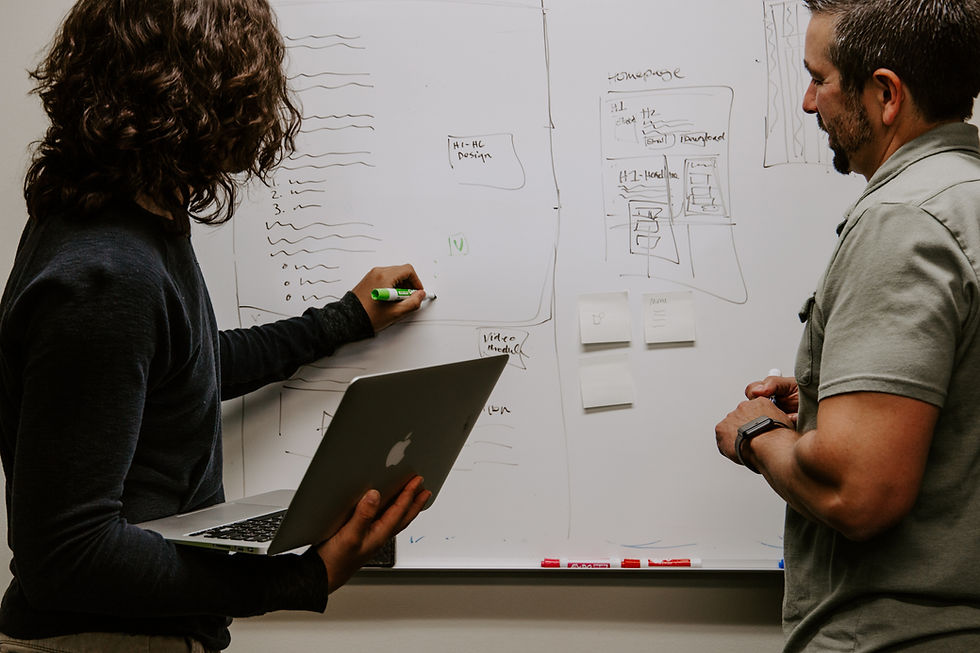Our Research
- Sabrina Bengtzen
- Jul 21, 2021
- 3 min read
Updated: Aug 18, 2021
Real data that shows why companies have chosen to do more than just business.

Over the course of several months we interviewed over 100 different companies from over 30 different industries, 13 different states, and 3 different countries. Our conversations have ranged from discussions about employee benefits in a mining organization to Q&As about diversity, equity, and inclusion initiatives at a beauty company. We have talked with decision makers at large international tech firms and chatted with storefront employees at a grocery store.
Our goal throughout this research has been to identify what types of social impact activities companies engage in and why. We believe that this understanding will enable us to co-create meaningful connections, purpose-driven content, and useful tools for companies striving to elevate the way they do business.
Social Impact Initiatives Companies Participate In

The first question we asked our interviewees was “What social impact activities does your company participate in?” We were impressed by the variety of responses. It is evident that organizations are striving to make society a better place through the products they create, the volunteering their employees engage in, the funding they provide to local NGOs, and the internal systems they defend.
We summed up the varying initiatives into seven major categories (as seen above):
grants/donations,
community partnerships,
NGO partnerships,
volunteering,
diversity, equity and inclusion,
employee and consumer relations,
and Eco-friendly initiatives.
The grants and donations category includes all companies that donate money to a specific cause, organization, or individual with the hope of a substantial impact. Community partnerships involve a business creating or hosting an event for their community or offering their products and services to benefit society in a meaningful way. Examples of community partnerships may include sponsoring a local race or providing leadership training to local schools. NGO partnerships are similar to community partnerships, but span across local barriers and include national and global nonprofit connections.
Volunteering, in this context, can be defined as companies intentionally donating their time and talents to make a difference in an organized way.
Diversity, equity and inclusion includes a company’s efforts to diversify their workforce and promote a positive and inclusive environment to employees and consumers.
Employee and consumer relations constitute the way companies treat their employees. This encompasses fair pay, ethical treatment, employee-consumer interactions, etc.
Finally, eco-friendly initiatives vary depending on the company, but might include reducing a carbon footprint or promoting sustainable materials in a product supply chain.
Why Companies Engage in Social Impact

The second question we asked our 100 companies was, “Why does your organization choose to engage in social impact activities?” We found that again, answers varied, as displayed above. We anticipate some of this variation coming from our diverse sample of companies. From startups to Fortune 500s, circumstances for each are far from the same. While the reason for engaging may differ, we admire businesses that have recognized a need for social impact in their organization and have found purpose behind implementing it.
Challenges Companies Face in Social Impact

If you are a company that engages in social impact initiatives, you are no stranger to this reality - barriers exist, and they can be massive. The final question we asked our participants was “What pain points have you come across in implementing your social impact initiatives?” The most prominent challenges are displayed above, and we break down what these categories indicated below.
The greatest challenge our data revealed was lack of resources. Companies who claim they are too small to focus on social impact, along with companies that have a lack of tools to implement effective social strategy, fall into this category.
The executive support bar references those organizations who feel they lack support from their higher ups in the ideation, implementation, or funding of their projects.
One of the unique and prominent barriers to social impact we found was a lack of unity across a company. Issues in these companies became prevalent when employees demonstrated a difference of opinion as to what is socially impactful and what isn’t. Disagreements or disconnect also occurred in the prioritization and internal communication of said social impact.
Funding describes companies that expressed a deep struggle to fundraise for their initiatives or a frustration with limits in their budget.
Since each company is individual and faces different problems we also included an "other" category in our summary. This grouping spans a variety of responses from challenges in measuring impact to challenges in global supply chain and local laws.
Finally, lack of time includes companies who recognize there is not enough time for employees to accomplish their daily tasks along with leading out social impact initiatives or regularly volunteering at a local NGO for several hours.
Despite these challenges, we have been impressed by companies’ tenacity in continuing to do good and in striving to be good.
If you are interested in learning more about our research processes and results please reach out to cocreateimpact@gmail.com.

Comentarios